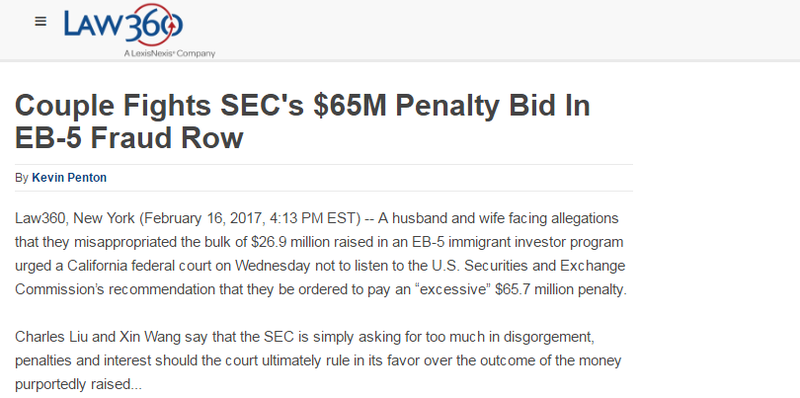Couple Fights SEC's $65M Penalty Bid In EB-5 Fraud Row
A husband and wife facing allegations that they misappropriated the bulk of $26.9 million raised in an EB-5 immigrant investor program urged a California federal court on Wednesday not to listen to the U.S. Securities and Exchange Commission’s recommendation that they be ordered to pay an “excessive” $65.7 million penalty.
Charles Liu and Xin Wang say that the SEC is simply asking for too much in disgorgement, penalties and interest should the court ultimately rule in its favor over the outcome of the money purportedly raised from foreign investors for a cancer treatment center, according to their memorandum.
Rather, the couple suggests that the court start at $26.9 million and go down from there, giving them credit for “legitimate business expenses” such as the $9 million they conveyed as commission payments to overseas marketers and the $2 million they spent on salaries, according to the memorandum. They argue that that a $10.9 million penalty would be more appropriate.
“The court should exercise its discretion and decline to impose the specific amounts of disgorgement and civil monetary penalties requested by the SEC,” the memorandum reads. “In view of the facts in this case, the SEC’s request for disgorgement in the total amount of funds raised from investors in addition to the full compensation of the defendants as penalties is doubly excessive, punitive and unnecessary for specific and general deterrence.”
In May, the SEC accused Liu and Wang of collecting approximately $27 million from 50 Chinese investors for the center, but failing to use the money for the promised purpose.
Rather, Liu transferred approximately $12.9 million of the investor funds to three marketing firms in China — including one of which he is CEO and chairman — and deposited more than $7 million in his and his wife’s personal accounts, the SEC said. Less than $250,000 remains, the government alleged.
The purported scheme took place through the apparatus of the U.S. government’s EB-5 immigrant investor program, in which foreign investors pledging at least $500,000 in capital investment in a commercial enterprise in the U.S. may be eligible for a two-year work and residency visa, with potential for permanent residency.
In early June, U.S. District Judge Cormac J. Carney signed a temporary restraining order freezing the couple’s assets and prohibiting them from raising additional funds or spending any of the money they had raised.
In January, the court opted to put in abeyance the SEC’s summary judgment bid, asking the parties to weigh in on appropriate penalties, according to court documents.
The SEC declined to comment, Erin Stattel, a representative for the agency, said on Thursday.
Counsel for Wang and Liu could not immediately be reached for comment on Thursday.
The SEC is represented in-house by John W. Berry, Gary Y. Leung and Jacob A. Regenstreif.
Wang and Liu are represented by Lawrence B. Steinberg of Buchalter Nemer PLC, and Herve Gouraige of Sills Cummins & Gross PC.
The case is Securities and Exchange Commission v. Charles C. Liu et al., case number 8:16-cv-00974, in the U.S. District Court for the Central District of California.
Mentions
Litigation Cases
States
- New York
Securities Disclaimer
This website is for informational purposes only and does not constitute an offer or solicitation to sell shares or securities. Any such offer or solicitation will be made only by means of an investment's confidential Offering Memorandum and in accordance with the terms of all applicable securities and other laws. This website does not constitute or form part of, and should not be construed as, any offer for sale or subscription of, or any invitation to offer to buy or subscribe for, any securities, nor should it or any part of it form the basis of, or be relied on in any connection with, any contract or commitment whatsoever. EB5Projects.com LLC and its affiliates expressly disclaim any and all responsibility for any direct or consequential loss or damage of any kind whatsoever arising directly or indirectly from: (i) reliance on any information contained in the website, (ii) any error, omission or inaccuracy in any such information or (iii) any action resulting therefrom.




